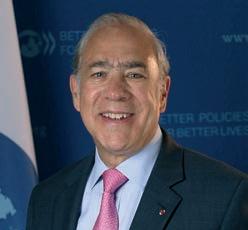Your views We welcome your feedback. Send your letters to observer@oecd.org or post your comments at www.oecdobserver.org
Torsten Bell @TorstenBell But how heavily are we currently taxed? All the debate focuses on tax take as a share of GDP—ie the size of our economy. On that measure historically we’re up (from the lows of the early 90s) but still below the OECD average and northern European norms. Tom Johnstone @itjohnstone On the impact of increasing life expectancy in wealthy OECD countries on health, healthcare & social support systems: yes populations are ageing, but not because people who live to 65 are going on to live much longer than they were 20 years ago. It’s more about demographic mix. Pedro Facon @PedroFacon Health at a Glance 2019: a must-read for each actor and stakeholder in healthcare. Comparative statistics help us to identify strengths and weaknesses of our healthcare system and to learn from good practices in other countries. @OECD_Social
Bees and the environment
Twitterings
Since my childhood, I have always been fascinated by bees and beehives. They work in a very complex yet organized fashion. Let’s protect them and our environment. Sometimes we forget how all our lives depend on a very delicate balance with the other species and our habitats.
Robin Oglivy @RobinOglivy Just read new @OECD report that brings worrying news before #UNClimateSummit. In advanced and emerging economies, 70% of energy-related CO2 emissions are entirely untaxed! Read here: http://oe.cd/2IB
Angela Capogrosso Sansone on LinkedIn, commenting on #WorldHoneyBeeDay, May 2019
Activism as lobbying The will of the people is received by way of elections, not by way of who shouts the highest. From that perspective, activism is about as democratic as lobbyism, and about as unpalatable when taken to extremes.
Björn Erling on LinkedIn, commenting on “How has #activism changed—and why is it more important now than ever?”, September 2019
No fear of automation Resisting automation is wasteful and ultimately pointless. Rather we need to prepare and train people to rise to a higher level and work alongside robots.
Luis Wolff Kono on LinkedIn, commenting on “1 in 6 middle-income workers are in jobs at high risk of automation. Are we ready for #thefutureofwork?” Experts from around the world will weigh in at the #OECDForum, June 2019
2
Alice Lyall @alicelyall Coastal tourism & climate change: decision makers seem unsure how to react; industry still focused on growth; only 25% of countries surveyed by OECD considered climate change in tourism policy! Nico Fulton @FultonNico Did you know DRC has >60% global cobalt? Vital for rechargeable batteries and achieving zero emissions. Important @OECD_BizFin report this week in #Kolwezi to tackle corruption and human rights concerns around cobalt. We must make our economy green AND clean. Prerana Mehta @cyberecowarrior ‘What is more challenging now is not to start-up, but to accelerate....we need pioneers to stay the course—and then maybe we can build cyber security ecosystems’. High energy honest discussions at the OECD Global Forum in Digital Security for Prosperity #GFDSP in the UK.
Marc-Antoine Dilhac @MarcADilhac The Global Partnership on AI is now on the right track. Very happy to see Canada, France and the OECD working together, with many other countries (UK, Germany, Japan, etc.) and major international organizations (UNESCO) to deploy AI that benefits humanity. It makes a difference. Glen Peters @Peters_Glen Global coal use is really China coal use superimposed on the decadal decline in OECD & rise in non-OECD. If global coal use has peaked or not, is really a question of Chinese coal use... https://bp.com/en/global/corporate/ energy-economics/statistical-review-ofworld-energy.html Bill Hare @BillHareClimate The ALP has a special responsibility to really be honest with coal regions about what the climate crisis means. Global coal use in electricity generation must fall by 80% below 2010 levels by 2030 and OECD nations should end coal use entirely by 2030.
Follow us on Twitter @OECDObserver Comments and letters may be edited for publishing. Send your letters to observer@oecd.org or post your comments at www.oecdobserver.org, or at the other OECD portals on this page.

















